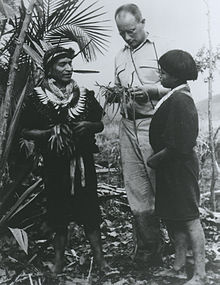Richard Evans Schultes
American ethnobotanist (1915-2001)
Richard Evans Schultes (January 12, 1915 – April 10, 2001) was an American ethnobotanist, curator of Harvard's Oakes Ames Orchid Herbarium, and professor of biology at Harvard University.

| This scientist article is a stub. You can help out with Wikiquote by expanding it! |
Quotes
edit- A very recent survey of natural hallucinogens has pointed out that more than 200 species of higher plants comprise the study, that they are widely distributed in the plant kingdom (146 genera in more than 50 families) and that the active principles are known for only about 45 species (Schultes and Farnsworth 1980) Bot. Mus. Leaft., Harvard Univ. 28 (186–190). This survey attributes the lack of chemical knowledge of these plants to two causes: (i) the lack of good animal models which the chemist can utilize in monitoring his isolation work; and (ii) the paucity of field work of scientific trustworthiness in fast disappearing aboriginal societies. The survey ends with the statement that the “… Plant kingdom remains a fertile and almost virgin territory for those interested in the discovery of new psychoactive drugs, not to mention other types of biologically active compounds waiting in silent hiding.”
- (1984)"Psychoactive plants in need of chemical and pharmacological study". Proceedings / Indian Academy of Sciences 93 (3): 281–304. DOI:10.1007/BF03053083.
- There have long been two strongly divergent poles in our evaluation of ethnobotany. Some students are carried away in an enthusiastic assumption that native peoples everywhere have a special intuition in unlocking the secrets of the Plant Kingdom. Others cast aside or at least denigrate all aboriginal folk lore as not worthy of serious scientific consideration. Both viewpoints, of course, are unwarranted.
The accomplishments of native peoples in understanding plant properties so thoroughly must be simply a result of a long and intimate association with their floras and their utter dependence on them. Consequently — and especially since so much aboriginal knowledge is based on experimentation — it warrants careful and criticai attention on the part of modern scientific efforts. It behooves us to take advantage now of this extensive knowledge that still exists in many parts of the world, lest it be lost with the inexorable onrush of civilization and the resulting extinction of one primitive culture after another. This experimentally acquired knowledge may not much longer be avaílable.- (1988). "Ethnopharmacological conservation: a key to progress in medicine". Acta Amazonica 18 (suppl 1-2): 393-406.
- Amazonia has given the world some of its most important plants: the Pará Rubber-tree (Hevea brasiliensis), the Pineapple (Ananas colossus), Cacao (Theobroma cacao), the Tapioca Plant or Cassava (Manihot esculenta), Coca (Erythroxylon coca var. ipadu), the Brazil-nut Tree (Bertholletia excelsa), paradise nuts (Lecythis spp.), the Curare liana (Chondrodendron tomentosum), and yet others. Each of these species has local ecotypes and wild relatives that may be of inestimable value in future genetic projects that may be oriented towareds various aspects of improving cultivated forms for greater yield, disease resistance, adaptation to different soil and climatic conditions, and sundry other characteristics.
- (1992)"Guest Editorial: Ethnobotany, Biological Diversity, and the Amazonian Indians". Environmental Conservation 19 (2): 97–100. DOI:10.1017/S037689290003054X.
External links
editEncyclopedic article on Richard Evans Schultes on Wikipedia